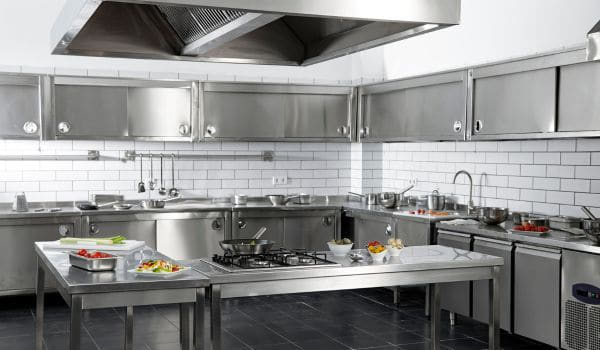In the realm of gastronomy, professional kitchens stand as the crucible where culinary artistry meets operational precision. Their significance extends beyond mere spaces for food preparation, embodying the heart and soul of any dining establishment. The evolution of modern professional kitchens mirrors a dynamic interplay between tradition and innovation. From the hierarchical kitchens of classical French cuisine to the contemporary open-concept spaces, the journey reflects a pursuit of efficiency, creativity, and adaptability. As the culinary landscape continues to evolve, understanding the major positions within these kitchens becomes pivotal in appreciating the orchestrated symphony that produces the delectable experiences we savor today.
Executive Chef

Role and Responsibilities
The Executive Chef serves as the visionary leader of the professional kitchen, overseeing and orchestrating all culinary activities. This pivotal role involves not only the creation and refinement of menus but also the strategic planning and execution of kitchen operations. From ingredient sourcing to the final presentation of dishes, the Executive Chef assumes ultimate responsibility for maintaining high culinary standards and ensuring a seamless dining experience.
Leadership and Decision-Making
At the helm of the kitchen brigade, the Executive Chef is tasked with providing clear direction and motivation to the culinary team. Effective leadership involves making timely decisions, delegating tasks, and fostering a collaborative environment. In the fast-paced and often high-pressure setting of a professional kitchen, the Executive Chef’s ability to make informed decisions and inspire the team is paramount to the overall success of the culinary venture.
Culinary Expertise and Creativity
The Executive Chef is not merely an administrator but a master of the culinary craft. Possessing a wealth of culinary knowledge, this position requires expertise in various cooking techniques, flavor profiles, and food pairings. Beyond technical skills, creativity is a hallmark of the Executive Chef’s repertoire. Innovating and conceptualizing new dishes, adapting to changing culinary trends, and infusing a unique flair into the menu contribute to the establishment’s distinct culinary identity under their guidance. The Executive Chef, therefore, stands as both a culinary virtuoso and an influential creative force shaping the gastronomic narrative of the kitchen.
Sous Chef

Support to the Executive Chef
The Sous Chef plays a crucial role in supporting the Executive Chef by effectively executing the culinary vision and ensuring the smooth functioning of the kitchen. This involves assisting in menu planning, recipe development, and overall management. The Sous Chef acts as a right hand to the Executive Chef, providing the necessary support to maintain the kitchen’s high standards and uphold the culinary identity of the establishment.
Supervision of Kitchen Staff
In addition to providing support to the Executive Chef, the Sous Chef is responsible for supervising and coordinating the activities of the kitchen staff. This includes assigning tasks, monitoring workflow, and maintaining a cohesive team dynamic. The Sous Chef often serves as a bridge between the brigade and the Executive Chef, ensuring effective communication and collaboration among team members.
Menu Development and Implementation
Collaborating closely with the Executive Chef, the Sous Chef contributes to menu development and implementation. This involves experimenting with new dishes, refining existing recipes, and ensuring that the culinary offerings align with the overall concept of the establishment. The Sous Chef’s input is instrumental in maintaining a diverse and appealing menu that meets both the culinary vision and the preferences of the clientele.
Line Cooks

Different Stations and Their Responsibilities
Line Cooks operate at various stations each specializing in specific types of dishes or cooking techniques. Responsibilities may include tasks such as grilling, sautéing, frying, or preparing cold dishes. Understanding and mastering the duties associated with their assigned station is crucial for Line Cooks to ensure the efficient and timely preparation of menu items.
Culinary Skills and Proficiency
Line Cooks are skilled practitioners of the culinary arts, possessing the technical expertise required for their designated stations. This includes a thorough understanding of cooking methods, knife skills, and a keen sense of timing. Proficiency in executing recipes with precision contributes to the consistent quality of dishes served in the establishment.
Coordination with the Kitchen Team
Effective communication and collaboration are essential for Line Cooks, as they work in tandem with other members of the team. Coordinating orders, sharing resources, and maintaining a synchronized workflow are vital aspects of their role. The ability to work seamlessly with fellow cooks ensures that the operates efficiently, delivering a cohesive and satisfying dining experience.
Pastry Chef

Specialized Role in Dessert Preparation
The Pastry Chef holds a specialized role within the, focusing on the creation of delectable desserts and baked goods. This includes crafting intricate pastries, cakes, and various sweet treats that complement the savory offerings on the menu. The Pastry Chef’s expertise lies in balancing flavors, textures, and presentation to provide a memorable and satisfying conclusion to the dining experience.
Baking and Pastry Skills
Central to the Pastry Chef’s skill set are advanced baking and pastry techniques. Mastery of precise measurements, temperature control, and an artistic touch are essential for creating visually stunning and palatably delightful desserts. From laminated dough for pastries to intricate sugar work, the Pastry Chef’s skills contribute to the diverse. And appealing dessert options that enhance the overall culinary experience.
Menu Contribution and Collaboration with the Kitchen
The Pastry Chef collaborates with the Executive Chef and Sous Chef to contribute to the overall menu. This involves aligning dessert offerings with the restaurant’s culinary concept and ensuring a harmonious balance between sweet and savory elements. Effective communication with other staff is crucial to synchronize the timing of dessert preparation with the main courses, providing a seamless dining experience for patrons.
Kitchen Manager
Administrative Responsibilities
The Kitchen Manager serves as the administrative backbone of the professional, overseeing day-to-day operations. This role involves scheduling, staffing, and coordinating workflow to ensure a well-organized and efficient environment. Administrative responsibilities also extend to managing budgets, tracking expenses, and addressing personnel matters.
Inventory Management and Ordering
One of the key functions of the Manager is to handle inventory management and ordering of supplies. This includes maintaining optimal stock levels, tracking ingredient usage, and placing orders with suppliers. A keen understanding of the needs and budget constraints is essential to prevent shortages or wastage.
Ensuring Compliance with Health and Safety Standards
The Manager plays a critical role in upholding health and safety standards within the kitchen. This involves implementing and enforcing sanitation protocols, ensuring proper food handling practices, and conducting regular inspections. Compliance with health and safety regulations is paramount to maintaining a safe and hygienic working environment for all staff.
Expeditor
Coordination Between Kitchen and Front-of-House
The Expeditor serves as the crucial link between the and the front-of-house staff, facilitating seamless communication and coordination. This role involves managing the timing of orders, ensuring that dishes are prepared and plated according to the established timeline, and coordinating the transfer of plates to the service staff. Effective communication with both and service personnel is essential for a smooth. And synchronized dining experience.
Quality Control and Final Presentation
The Expeditor plays a pivotal role in maintaining quality control by meticulously inspecting each dish before it leaves the. This involves checking for accuracy, ensuring proper portion sizes, and confirming that the presentation meets the established standards. The Expeditor acts as the last line of defense to guarantee that only top-quality dishes reach the diners, contributing to overall customer satisfaction.
Time Management and Communication Skills
With a focus on efficiency, the Expeditor must possess strong time management skills to keep the running smoothly. Coordinating multiple orders and prioritizing tasks require a keen understanding of the workflow. Additionally, effective communication is paramount, as the Expeditor relays important information between the team. And front-of-house staff, ensuring that everyone is informed and on the same page.
Dishwasher
Vital Role in Maintaining Kitchen Hygiene
The Dishwasher holds a critical role in maintaining the cleanliness and hygiene of the. This includes washing and sanitizing all kitchenware, utensils, and equipment used in food preparation. By adhering to strict hygiene standards, the Dishwasher contributes to the prevention of cross-contamination. And the overall health and safety of the environment.
Cleaning and Sanitation Responsibilities
Beyond dishwashing, the role involves general cleaning and sanitation duties throughout the kitchen. This includes keeping work surfaces, floors, and storage areas free from debris and maintaining a tidy and organized space. The Dishwasher’s attention to cleanliness is essential for creating a safe and efficient work environment for the entire team.
Support to Overall Kitchen Operations
While the Dishwasher’s primary responsibility is maintaining cleanliness, their role extends to providing support for overall operations. This may involve assisting with basic food preparation tasks, handling waste disposal, and collaborating with other staff to ensure a cohesive and smoothly functioning workspace. The Dishwasher’s contribution is integral to the efficient and effective operation of the entire kitchen.
Commis Chef
Entry-Level Position and Training Ground
The Commis Chef holds a pivotal role as an entry-level position within the professional, serving as the training ground for aspiring culinary professionals. In this capacity, individuals are exposed to the fundamental aspects of operations, gaining hands-on experience and developing a foundational understanding of culinary techniques and practices.
Assisting in Various Kitchen Tasks
Commis Chefs are responsible for supporting the more experienced members of the brigade in various tasks. This may include food preparation, cooking, and plating under the guidance of senior chefs. The role provides invaluable exposure to different aspects of the, allowing individuals to learn and refine their skills across multiple stations.
Skill Development and Career Progression
Commis Chefs undergo continuous skill development, honing their culinary abilities and expanding their knowledge base. This position acts as a stepping stone for career progression within the culinary industry. With dedication and perseverance, Commis Chefs have the opportunity to climb the ranks. It is taking on more responsibilities and eventually specializing in specific areas of the kitchen.
Conclusion
In the intricate tapestry of a modern professional kitchen, each role plays a distinctive part in ensuring the success of culinary operations. From the visionary Executive Chef to the meticulous Dishwasher, the collaborative efforts of these professionals result in a harmonious symphony of flavors and experiences for diners. The Commis Chef, as the entry point into this dynamic environment, embodies the promise of growth and development within the culinary world. As individuals progress through their roles, from Commis Chef to higher positions, they contribute to the evolving narrative of gastronomy, shaping the future of culinary excellence.





